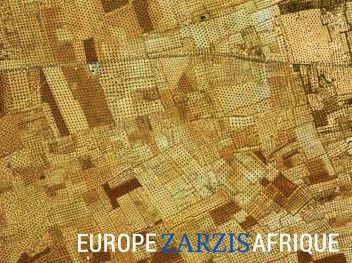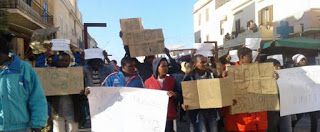Borderline Sicilia: “Defending Migrants Means Defending Everyone”
Vita.it – From monitoring what’s happening on the ground, to campaigning against torture in Libyan detention centres, right up to the appeal presented on behalf of two migrants of the Diciotti: a journey through the projects undertaken by the association Borderline Sicilia. Dedicated to the defence of human rights since 2007, the association listens to and helps migrants in difficulty landing on Italian shores, listening to the witness accounts that have marked an era, and reporting illegal practices undertaken by the government as well as other people.
From the recent appeals in the Court of Human Rights on the Diciotti case to the gathering of accounts by thousands of migrants who have arrived in Sicily across the Mediterranean in recent years, to the detailed monitoring of what’s happening across the island: the association Borderline Sicilia has been a point of reference for migrants arriving on our shores in search of a better future for more than a decade – and now more than ever. At the same time, it represents a voice to one side of the choir, important now more than ever before even for the experts, in a context in which the issue of immigration is being constantly instrumentalised by politics and the media.
“We were standing in front of our own sea, where people were dying, and we couldn’t consider that to be just some accident. The bodies washing up with the waves where the result of specific immigration policies enacted by Italy and the EU” recalls Paola Ottaviano, 40, and Germana Graceffo, 21, two lawyers (in the photograph) and experts in immigration law. Since they met in Agrigento in 2006, through their association they have continued to defend those without a voice, at the same time providing a service of counter-narrative through reports and detailed analysis that constantly presents the situation for migration, in Sicily in particular.
Borderline Sicilia was established in 2008 and is supported by the German protestant church and the Italian charitable tax-assignment “5 per mille” as well as private donations. Aside from the two lawyers, the association includes Judith Gleitze, Alberto Biondo and Elio Tozzi and a wide network of volunteers who dedicate their time and energy.
“There were already people constantly arriving by sea back then. The process of using the law to create a fortress out of Europe was already forcing people to entrust themselves to people traffickers. Italy was doing deals with Libya, just like now” the two lawyers explain, recalling the Treaty of Friendship agreed by Italy and Libya in 2008.
Borderline Sicilia organised a first public event, a ceremony to remember and denounce the dozens of deaths at sea on the first anniversary of the massacre at Vendicari, province of Syracuse. It was a solemn moment including the participation, among many others, of relatives of the victims, tracked down by the Sicilian association. A sculpture by Antonino Nicchitta (known as ‘Niki’) was erected among the tourist beaches in memory of the victims.
Recollection and reporting. Memory and action. In 2011, with the Arab Spring upon us and a constant flow of landings, Borderline Sicilia created an observatory on immigration to Sicily and, at the same time, a blog that was called ‘migrant-sicily’ in order to provide information and publicise what was happening in Sicily through the voices of direct witnesses, migrants themselves.
Among the issues dealt with by Borderline Sicilia over the years a few stand out: reports on the events surrounding “forced boat-drivers” or “boat-drivers by necessity”, about which Vita.it has also written; the important highlighting of abuse in government institutions and within the third sector, which has created a vast business across Sicily, off migrants’ backs; the attention laid on unaccompanied foreign minors; the critique of the Dublin system; the abuses and violence suffered by migrants in the Libyan detention centres.
“We help people who have no hope any more, people who don’t find any means of assistance, and not only from a legal point of view” explains Germana Graceffo, underlining the importance of giving a voice to migrants themselves. “Otherwise they won’t have any representation, above all in the institutional sphere,” Borderline Sicilia is part of OpenEurope, a project that helps people excluded from the institutional hostels and the system of international protection, founded by the Waldesian Deaconry and Oxfam Italia in 2016.
Among the most important of their actions over recent years one has to pick out the report on Libya written in collaboration with MEDU (Doctors for Human Rights) and Oxfam. The first report was published in 2017, updated and expanded each year, based on hundreds of witness accounts provided by migrants who have arrived on our shores. “What comes out from this collection of accounts is a general view in which migrants are always represented as a good to be exchanged, canon fodder, victims of inhuman and degrading treatment. In Libya there is no distinction between who is part of state institutions, the traffickers, the militia and those who simply find themselves in an open-air detention centre” explain the two lawyers, criticising the decisions of the previous Minister of the Interior, Marco Minniti. “In this appalling situation, the previous government decided to sign a further agreement with Libya, giving the Libyan Coast Guard economic and logistical support. On the basis of what we have gathered together and the evidence coming out of Libya, and in a context that is only worsening with time, we decided to denounce what’s happening with Italy’s collaboration.”
In the 2019 report, Oxfam and Borderline Sicilia report how, two yearsì on from the Italy-Libya agreement, the number of deaths has not decreased, standing at 5,300 in 2018 and 143 out of only 500 arrivals in 2019, while the conditions in the Libyan concentration camps have worsened, where migrants are brought back to after being “rescued” by the Libyan Coast Guard.
Furthermore, Borderline Sicilia is providing legal assistance to two migrants who landed last summer on board the Diciotti, where they were detained for 10 days, 5 of those days in front of the port of Catania while awaiting authorisation for the landing from the Minister of the Interior. Graceffo, together with fellow lawyers Antonella Mscia, Leonardo Marino and Nello Papandrea presented an appeal to the European Court of Human Rights on behalf of the two migrants, which will now need to take a stance on Italy’s conduct. At the same time, Borderline Sicilia (together with the Catanian Anti-Racist Network) presented an official complaint to the public prosecutor in Catania.
“As far as we are concerned, this amounted to the detention of persons. According to international conventions, all the people saved by the Italian Coast Guard should have been allowed to land in a port of safety. Instead these people’s rights were not respected, all people in a vulnerable conditions, already victims of torture in Libya. On board the Dicioitti their personal freedom was removed and they were detained without any reason connected to public order, nor through any court order” explains Paola Ottaviano, who went on board the Diciotti last summer. “They asked me why they had to stay there under the cover of one ship: 177 people, who gradually decreased in number but never less than 150, with only two toilets, sleeping on pieces of cardboard at night, in conditions that to our mind were inhumane” she adds.
Borderline Sicilia’s dedication to recent events connected to immigration is reflected in their daily work of spreading information from below, including going door to door. “More than ever, we need to be among people right now. The TV only speaks to people’s stomachs. We want to listen to people. We need moments of meeting in the schools, churches, mosques, wherever there is the possibility for an exchange of experiences, in order to speak about rights in a different way, starting with the Italian Constitution.”
It is with this in the background that the project “Ponti, no muri” (‘Bridges, Not Walls’) took place in Bagheria, including Borderline Sicilia among many others, financed by the European Union. The project has supported the creation of centre for legal advice for migrants. “We support a local grass-roots committee that came together after one of many episodes of racism, suffered on this occasion by a young man in an asylum seekers hostel in the area. We always try to support small local initiatives that take action for such values” explains Germana Graceffo, adding: “For some time now we’ve seen the hatred that is now being fed by the political narrative. Today we’re at a peak. This needs to be resisted more than ever because from this point on it will be difficult to turn back” the lawyer concludes.
And then there are the stories, collected fro, those who have arrived by sea, such as in Vendicari, Pozzallo or Lampedusa, stories that remain seared in one’s memory. Paola and Germania remember the Moroccan father of an autistic child, who ran away from his country to find medical treatment, or the Ethiopian mother who had been granted with refugee status in Yemen and was about to leave for the USA, when a bombing forced her to flee instead to Egypt and Libya, suffering terrible violence.
When you come across stories such as these they can still move you, because between dedication and activity, between active memory and counter-narration, the work of Borderline Sicilia always contains something wonderfully human, that aims to bridge the gap left by a politics that ignores the weakest, instead offering a confident response to those who have lost hope and know not where to turn.
Alessandro Puglia
Project “OpenEurope” – Oxfam Italia, Diaconia Valdese, Borderline Sicilia Onlus
Translation by Richard Braude





